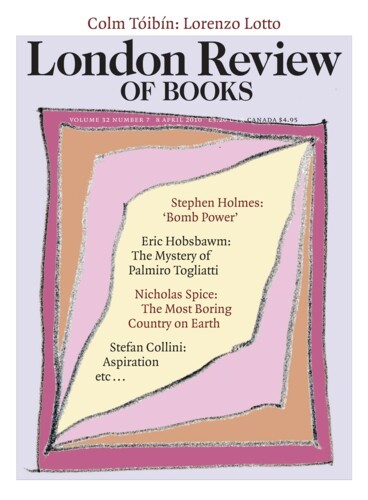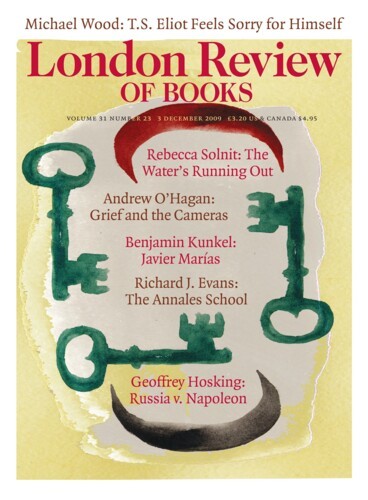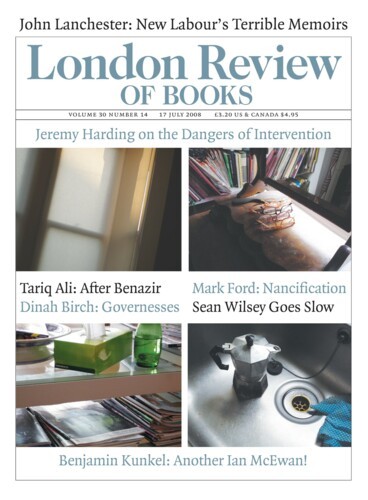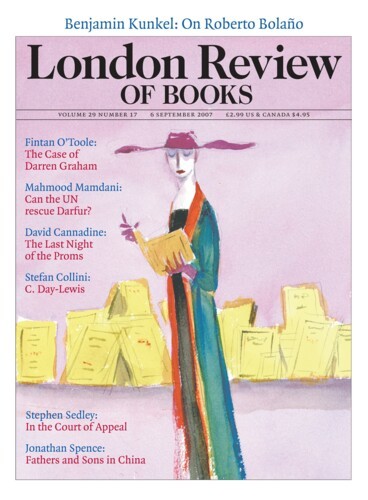Benjamin Kunkel
Benjamin Kunkel co-founded the journal n+1 and is a member of NLR’s editorial committee. His books include a novel, Indecision, and Utopia or Bust: A Guide to the Present Crisis.
Lingering and Loitering: Javier Marías
Benjamin Kunkel, 3 December 2009
In one of literary history’s great instances of the pot calling the kettle black, Henry James complained of ‘the absence of spontaneity, the excess of reflection’ in George Eliot’s work. To other readers, of course, the proportion that Eliot – or even late James – sets up between narrative spontaneity (or action and event), on the one hand, and reflection...
Men in White: Another Ian McEwan!
Benjamin Kunkel, 17 July 2008
‘Netherland’ is an ambiguous word. It evokes, of course, the Netherlands inhabited by the Dutch, one of whom, Hans van den Broek, tells this story of a few late years spent in that New World city founded almost four hundred years ago on Manhattan Island as New Amsterdam, in what was then the territory of New Netherland. But ‘netherland’ could also mean any faraway place, as in those ‘nether regions’ of the city where Hans’s teammates from the Staten Island Cricket Club spend their nights. (Hans spends his nights in Chelsea, a Manhattan neighbourhood hardly described in this book, notable for a high concentration of well-built gay men, new condominiums, art galleries, bank branches and large home-furnishing outlets.) ‘Netherland’ also has sinister overtones of Never Never Land, and sounds like a euphemism for Hades.
In the Sonora: Roberto Bolaño
Benjamin Kunkel, 6 September 2007
Roberto Bolaño was born in Santiago de Chile in 1953, moved with his family to Mexico City at the age of 15, and was inspired by the election of Salvador Allende to return to his native country five years later. In his short story ‘Dance Card’, which accords with the known facts of his life and does not present itself as fiction, Bolaño indicates that he hardly distinguished as a young man – if he ever did – between his politics and his love of poetry: ‘I reached Chile in August 1973. I wanted to help build socialism. The first book of poems I bought was Parra’s Obra Gruesa (Construction Work).’ He then bought another book by Nicanor Parra, the anti-rhetorical Chilean poet whose work Bolaño preferred to that of the more celebrated Pablo Neruda – a preference, it seems clear, for Parra’s plain-spokenness over Neruda’s florid multiplication of metaphor – and, in his telling, this was practically all the work towards socialism Bolaño accomplished before his arrest, following Pinochet’s coup of September 1973, as a ‘foreign terrorist’.
Pieces about Benjamin Kunkel in the LRB
Pfired! Benjamin Kunkel
Daniel Soar, 5 January 2006
When in doubt, toss a coin. If you really can’t decide which alternative is preferable, if everything seems equal and you don’t care a damn, it can’t matter what you settle on....
Read anywhere with the London Review of Books app, available now from the App Store for Apple devices, Google Play for Android devices and Amazon for your Kindle Fire.
Sign up to our newsletter
For highlights from the latest issue, our archive and the blog, as well as news, events and exclusive promotions.




